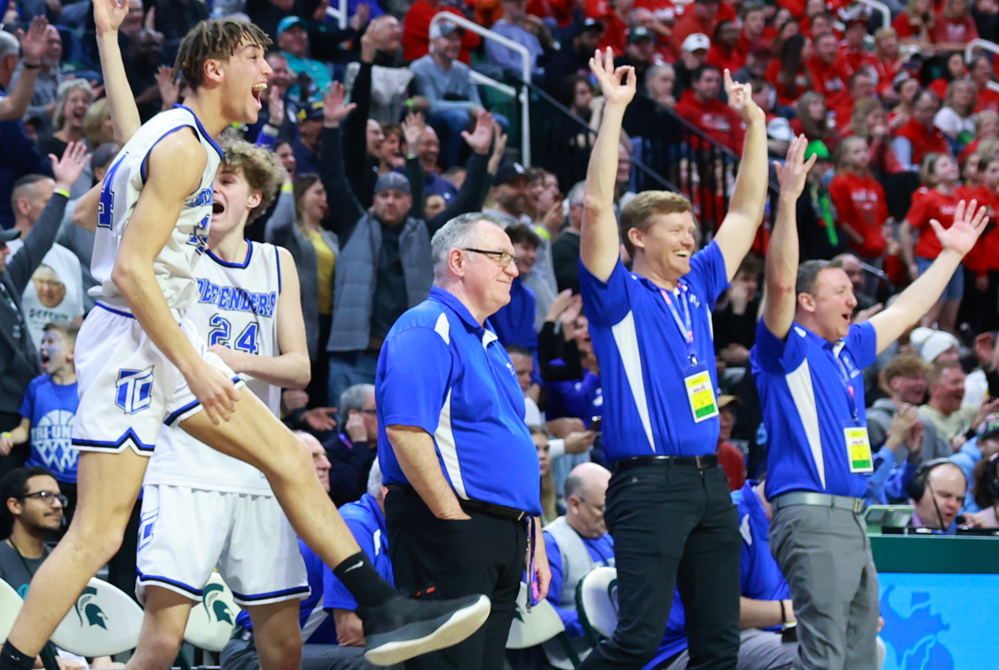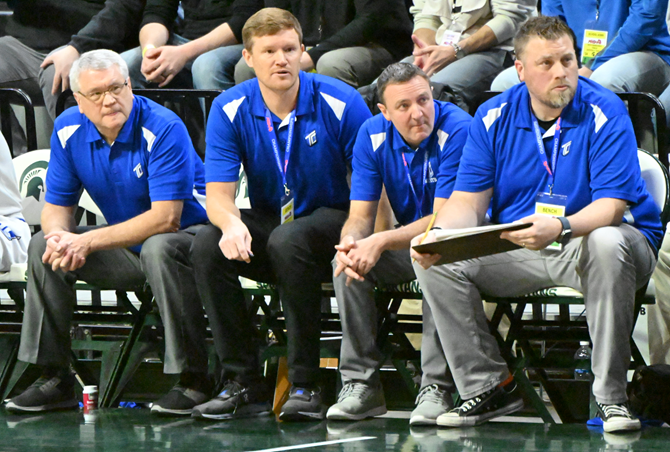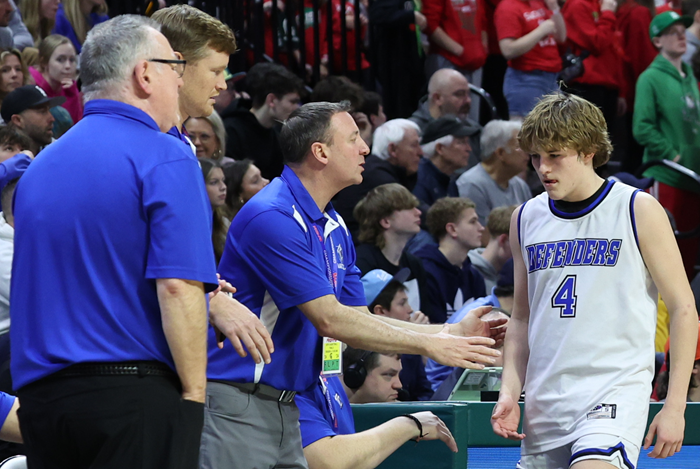
Powerful Voice for High School Sports
December 19, 2014
By Geoff Kimmerly
Second Half editor
Paul Carey was home from the U.S. Army only a few months and just shy of 25 years old when Beal City embarked on its first trip deep into the MHSAA boys basketball tournament.
On the call for local radio station WCEN from gyms at Saginaw Arthur Hill and Lansing Sexton, Carey served as the voice of the previously “laughable” Aggies as they reached the Class D Semifinals before falling just six points short of playing for the title.
“All of Beal City emptied out. They’d never had anything before,” Carey recalled during his annual Thanksgiving weekend visit to the MHSAA Football Finals at Ford Field. “When I got home, within the next two weeks I got a letter from every citizen of Beal City thanking me for broadcasting their games. That’s the kind of appreciation that meant so much.”
During 42 years on the airwaves, Carey was best known as a voice of the Detroit Tigers bounding out of transistor radios all over Michigan, thanks to WJR’s powerful signal.
But for the state’s high school sports community, his legacy is similarly memorable as the voice of the longtime football and basketball scoreboard show and a voter for various all-state teams and wire polls over the decades.
Now 86 and retired since 1991, Carey remains a regular during the first day of the Football Finals, taking in games he broadcast for the MHSAA during the late 1970s and that continue to hold his eye as they have for more than a half-century.
“It was a passion of mine. High school sports always has been,” Carey said. “I think because my dad was a high school coach, and teacher initially, and my brother was a high school coach and teacher, I just grew up in families that appreciated coaching and athletics. I was not a great athlete, but it kept my hand in following sports that way.”
Now, the scores
Carey partnered with Ernie Harwell for Tigers radio broadcasts from 1973-91, including during the march to the 1984 World Series championship. He was named Michigan Sportscaster of the Year six times and to the Michigan Sports Hall of Fame in 1992.
But Carey’s early career included sitting on top of a car, plugged into a phone pole, for a Sacred Heart football game at old Fancher Field just a few blocks from his family’s Mount Pleasant home. Among many more accolades are a Distinguished Service Award from the Michigan High School Coaches Association and a place in the Basketball Coaches Association of Michigan Hall of Fame.
In fact, the start of his weekly announcing of statewide football and basketball scores preceded his baseball career by 16 years and ended two months after he announced his final professional out.
The Michigan High School Scoreboard show was a staple of WJR’s late Friday nights from 1957-91. Carey would read every score he could collect from a variety of sources, often organized by league and with state rankings and context mixed in.
His idea came from something similar read by Len Colby for Kalamazoo’s WKZO. Carey’s brother Terry was coaching at Niles during the second half of the 1950s, and he and other coaches would get together to listen to the Friday night scores from the southwestern part of the state.
Carey, who left WKNX in Saginaw for WJR in 1956, explained to then-sports director Bob Reynolds that the station’s strong signal could provide for a truly statewide scoreboard experience.
Carey then connected with Edgar Hayes of the former Detroit Times, who gave the OK for Carey to call the paper on Friday nights to get scores from the Detroit metro area. For the rest, Carey relied on wire services – there were three at the time – who relied on newspapers from all over Michigan to call in scores over the course of an evening.
Before every Friday during high school football season – and later Tuesdays and Fridays during boys basketball season – Carey typed up lists of games based on schedules in the newspaper, with spaces to add scores. More than a few times, Carey raced down a back ramp at Tiger Stadium after a Friday night game, back to the WJR studio, with 15 minutes to prep for the show’s 11:30 p.m. start.
“If the Flint Journal, the Grand Rapids Press, the Traverse City paper didn’t call in scores to the AP, then I was out of luck too. And that happened all the time,” Carey said. “I would call back occasionally, say, ‘Did you get anything more?’ It was a rat race.”
The show originally was set for 10 minutes and then extended to 15. American Airlines sponsored a record show that followed, and Carey’s scoreboard show had a sponsor only once in 35 years. Finishing up on time was expected, even with more than 200 scores to read.
But Carey said he always went 20 minutes, sometimes 25.
“Because I wasn’t done. I just kept right on going,” Carey said. “Jay Roberts did the all-night show most of the time, and he was patient with me. He didn’t say too much on the air about ‘that guy ahead of me took all of my time.’”
Carey continued the “rat race” until his final scoreboard show, Dec. 20, 1991. He retired from WJR at the end of that calendar year. And it's important to note: Carey was never paid a dime extra for doing the program. .
“I think Paul is really just a sports fan, and that came across to the listener on his broadcasts,” MHSAA historian Ron Pesch said. “Paul would gather as much as possible off the wire. He'd interject if scores were missing from sections of the state. Press polls from the Free Press, News, AP and UPI were big, so he could point out close calls and upsets.
“He provided immediacy, or the closest thing to it in the days before cable TV and the Internet, and because of his scoreboard show, you could get the results before the morning paper. For listeners, he brought life to something as simple as game scores.”
First team all the way
Carey, who resides in Rochester, also served as the engineer on Tigers broadcasts for 16 years, through 1990. He broadcast Pistons games on the radio for six seasons and did the first broadcast of a Central Michigan University football game, in 1949.
Harry Atkins, covering Detroit’s teams while with The Associated Press for 29 years including the last 21 as its sports editor for Detroit, took note of his colleague's hard work – and especially that Carey was one of few broadcasters who was a journalist in addition to a voice.
That made Carey's other major role in high school sports a natural fit.
Atkins split The Associated Press all-state selection panels for football and basketball into 11 regions, and Carey represented the Detroit area for a number of years. He also was a longtime voter in those sports' weekly polls.
“Paul is just that kind of guy. He thought it was important and he made time in his busy schedule to do it,” Atkins said “And it had an impact on the other 10 voters on the All-State panels, too.
“Some of them were from small out-state newspapers or radio or TV stations. Yet every one of them knew who Paul Carey was. And when he spoke, of course, with what often is called "The Voice of God," those voters paid attention.”
And he still does, as well.
At the end of each fall, Carey still puts together a compilation of the three high school all-state football teams – Associated Press, Detroit Free Press and Detroit News – and files them with years of research and results.
“It’s important to me. Nobody sees it but me, but I get a certain kick,” Carey said. “Once in a while I’ll see a kid playing at Central, Western or (Michigan) State or Michigan, and they’ll say he came from Clawson. I’ll go into my all-state collections, say that would’ve been 2009 he played, and I find a name.”
In addition to the Football Finals on WJR, Carey was part of the Baseball Finals broadcasts into the early 1990s, continuing to contribute even after his retirement from his fulltime gig.
He spent high school games over the years sitting next to legends like the Free Press’ Hal Schram and remembers when current Free Press longtime scribe Mick McCabe was just a rookie. One of Carey's final broadcasts was a 1992 Baseball Final with his nephew Mike Carey, who continues to broadcast MHSAA championship games to this day.
“I am eternally grateful to Paul Carey. His contribution to high school sports in Michigan has been great and significant,” Atkins said.
“We are lucky to have him.”
PHOTO: Paul Carey (left) and nephew Mike Carey broadcast the MHSAA 1992 Class D Baseball Final between Hillman and Athens for PASS.

Championship Experience from Coach's Point of View Unimaginable, Unforgettable
By
Dean Holzwarth
Special for MHSAA.com
April 4, 2024
WYOMING – As the final buzzer sounded, it was all I could’ve imagined – and more.

In the weeks leading up to March 16 and the Division 4 championship game, I experienced every emotion possible as I envisioned what it would feel like to be an assistant coach on the bench at Michigan State’s Breslin Center as the Wyoming Tri-unity Christian boys basketball team achieved its ultimate goal.
In my first year as the junior varsity coach at Tri-unity, I had been on the varsity bench for a majority of the season, assisting legendary coach Mark Keeler and fellow assistants Brent Voorhees, Bob Przybysz and Mike Kaman.
I was there encouraging, motivating and supporting the varsity team. It was a role I embraced, and had become accustomed to over my almost 30 years coaching high school basketball.
I started coaching in 1995 as Jim Ringold gave me my first opportunity as the freshmen girls coach at Wyoming Kelloggsville High School. I would then coach Kelloggsville’s freshmen boys team for eight seasons, while also coaching the freshmen girls at Grandville High School. I would also coach the junior varsity teams at both schools.
I love coaching. I have a passion for it. I’ve always enjoyed getting the most out of my players while creating a bond between player and coach.
When girls basketball season moved from fall to winter joining the boys in 2007-08, I stayed at Grandville. I spent 21 seasons there before stepping down.
I still wanted to coach, and I heard that the Tri-unity junior varsity position was available. I had always respected and liked Keeler and was excited for the prospect of joining a perennial powerhouse.
I didn’t really know about Tri-unity growing up in the Wyoming Park school district. But as a young kid, I would rush home and eagerly await the afternoon delivery of the Grand Rapids Press. I would quickly find the sports page and read it from front to back, hoping one day to see my byline.
I began writing for the Press’ sports department in 1997. It was my dream job. And that’s also when I first started covering Tri-unity boys basketball.
I remember watching eventual NBA all-star Chris Kaman, along with Bryan Foltice and others play for this little Christian school and have unbridled success under Keeler.
MHSAA Tournament runs became the norm for the Defenders. They won their first Finals title in 1996, and they would claim four more over the next 26 years. They also had six runner-up finishes.
 I was sitting on media row writing for MHSAA.com in 2022 when Brady Titus led Tri-unity to its fifth state championship.
I was sitting on media row writing for MHSAA.com in 2022 when Brady Titus led Tri-unity to its fifth state championship.
I never thought that two years later I would be on the coaching staff as the Defenders pursued another one. But there I was.
I knew this year’s team had the potential to be special.
Tri-unity had returned four of its five starters from a year ago, after suffering a heart-breaking two-point loss to Munising in the Division 4 Final.
Eight seniors were on the roster. The team had a mix of talented guard play, senior leadership, size and depth. We had shooters and we played great defense, a trademark of Keeler’s teams.
This was the year, and that heaped lofty expectations on Keeler and the team. It was basically “state championship or bust.” Anything less would be considered a disappointment.
Keeler wanted it badly, and I knew the players did as well. I think they felt the pressure at times of living up to the expectations that had been set.
We had several lopsided wins, but also had a few tough losses to Division 2 and Division 3 teams – Grand Rapids Forest Hills Central, Wyoming Lee, Grandville Covenant Christian and Schoolcraft – all talented teams that I think made us better despite falling short.
As the postseason started, there was anxiety and excitement.
We were one of the favorites, but it wouldn’t be easy. We would have to earn each of the seven victories needed to win it all.
First came a District title, but then we had to play a quality Fowler team in its home gym in the Regional Semifinal. This was a game we knew would be a challenge – and it was.
We led by only one at halftime after a 7-0 run to end the second quarter. The score was tied 33-33 in the fourth quarter before senior Lincoln Eerdmans made a key 3-pointer to spark our victory.
As we went through the handshake line, several Fowler players said, “Good luck in the Finals.”
Our defense played extremely well in the Regional Final and state Quarterfinal to secure our team another trip to the Breslin.
St. Ignace was our opponent in the Semifinal, and we had to face a senior guard who could do it all – Jonny Ingalls. He lived up to the hype. He was good, and we didn’t have any answer for him in the first half. We trailed by one, only to fall behind by seven late in the third quarter.
Was this the end? Were we going to fall one game short of our goal?
 We were down by five points in the fourth quarter, but junior guard Keaton Blanker, and others, rose to the occasion. We rallied to win a tight one, and now we were one win away from a Division 4 title.
We were down by five points in the fourth quarter, but junior guard Keaton Blanker, and others, rose to the occasion. We rallied to win a tight one, and now we were one win away from a Division 4 title.
The night before the championship game, we stayed at a hotel in East Lansing as we had the first game of the day at 10 a.m. We had a team dinner, and the players seemed relaxed and eager to close out the season the way they had intended.
There was one thing that worried me. We were playing Mount Pleasant Sacred Heart. A team we had played in the second game of the season and defeated by 30 points.
Would we be overconfident? I had no idea. They were a different team now, but so were we. Anything could happen.
Keeler gave a spirited and emotional pregame speech. In last year’s loss to Munising, he felt like the team played not to lose, and this season his big thing was “I want to win.” He said it to every starter that Saturday morning during the final moments in the locker room before tipoff, asking all five individually to say it back – which they did, the first one quietly but followed by teammates replying louder and louder as everyone got fired up and “I want to win” rang through the locker room. I think it inspired all of us.
After a competitive first quarter, we started to find our rhythm and expanded the lead. We were ahead by double-digits at the half, and a state title was within our grasp. Senior Wesley Kaman buried a 3-pointer in the final seconds of the third quarter to give us a 20-point cushion. It was at that point I knew we were going to win.
All five starters reached double-figure scoring, led by Jordan VanKlompenberg with 19 points and Owen Rosendall with 14. That balance was intentional and a successful sign for our team all season.
The exhilaration of winning was intoxicating. I loved watching the boys celebrate something they had worked so hard to accomplish. I will never forget their faces. I looked to my right from my seat on the bench and watched them running onto the court, just wearing their joy. They were just elated.
I was so happy for Keeler, a devout Christian who is respected by so many people in high school basketball circles. I learned so much from him this season. The way he approaches each game, his competitiveness. He instills his strong faith in his players and understands that the game of basketball is a bridge to a higher purpose.
Keeler is the fourth-winningest coach in state boys basketball history with a record of 694-216, and will be the winningest active coach next winter as all-time leader Roy Johnston retired from Beaverton at the end of this season.
The tournament run was one of the best coaching experiences I have had, and I feel blessed to have had the opportunity to be a part of a state championship season.
 Dean Holzwarth has covered primarily high school sports for Grand Rapids-based WOOD-TV for five years after serving at the Grand Rapids Press and MLive for 16 years along with shorter stints at the Ionia Sentinel and WZZM. Contact him at [email protected] with story ideas for Allegan, Kent and Ottawa counties.
Dean Holzwarth has covered primarily high school sports for Grand Rapids-based WOOD-TV for five years after serving at the Grand Rapids Press and MLive for 16 years along with shorter stints at the Ionia Sentinel and WZZM. Contact him at [email protected] with story ideas for Allegan, Kent and Ottawa counties.
PHOTOS (Top) The Wyoming Tri-unity Christian bench, including the author (far right) and head coach Mark Keeler (middle), celebrate a 3-pointer late in the Defenders’ Division 4 championship win over Mount Pleasant Sacred Heart. (Middle) Tri-unity’s assistant coaches, including Holzwarth (second from right), monitor the action. (Below) Holzwarth and the coaching staff greet Keaton Blanker (4) as he comes off the floor. (Photos by Hockey Weekly Action Photos.)

